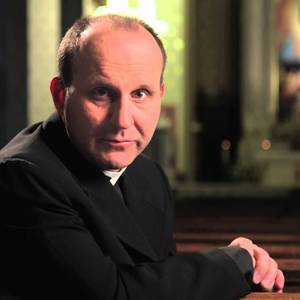Where do we locate the “good news” of Jesus Christ? We find it in the Word of God in Sacred Scripture, announcing to us the “day of salvation.” (II Cor 6:2) We are thankful for the Sacraments that bring divine life to the soul and make us citizens of the Kingdom of God. We strive for faith, hope and charity, which help us to become more Christlike. We look to the Cross for the light and strength it offers us in sacrifice and suffering. Even the self-renouncing virtue of humility, as challenging as it is, attracts us, if only because we admire it in others. But what about chastity? Can I say with conviction that I believe that chastity is part of the good news of Gospel? Am I as committed to growing in this human virtue, as I am committed to growing in the theological virtues and to other aspects of the Christian life?
Perhaps we undervalue chastity because we misunderstand it. The word may only suggest something negative to me, i.e. what I am not doing. We might think of chastity solely in terms of temperance—controlling the desire for sexual satisfaction—rather than first in terms of relationships. In other words, chastity is also related to justice, the virtue that calls for us to render another his or her “due.” In more plain terms, a chaste heart approaches someone as a person, with inherent dignity, and not just a potential sexual partner. Let’s recall how Jesus raised the bar for us in all human relationships, when He recast the second part of the Great Commandment: “Love one another as I have loved you.” (Jn 13:34) Jesus approaches everyone with reverence, and calls upon us to do the same.
Chastity is not only a virtue, but it is also one of the evangelical counsels, along with poverty and obedience. The Catechism says that the evangelical counsels are “inseparable from the Commandments” (par 1973), because Christ proposes them “in their great variety to every disciple.” (par 915) Jesus lived a life poor, chaste and obedient. Because of our Baptism, we have “put on Christ,” as St Paul wrote (Gal 3:27), and so we take Jesus as our model in everything, each according to his or her state in life. Therefore, we should not think of the evangelical counsels only as renunciations or sacrifices, which, of course, they are. But they are also participations in the life of Christ—virtues where we can encounter Him—because the counsels form part of the New Law of love of the Holy Spirit. (cf. Rom 5:5 and CCC 1966 and 1973)
This means that for Christians, chastity is also directly related to charity, “by which we love God above all things for His own sake and our neighbor as ourselves for the love of God.” (CCC 1822) Said negatively, to fail in chastity is to fail in charity. But said positively, to grow in chastity for the love of God is to grow in the perfection to which the New Law of love invites us. Striving for perfection for the love of God is holiness, the vocation of all disciples.
There is another aspect of chastity for us to consider here, because the New Law of love is also the “law of freedom.” (CCC 1972) This is not a freedom that gives free reign to the flesh, as St Paul told the Galatians, but a freedom that is self-forgetful and self-giving. (5:13) The Catechism indicates that “chastity includes an apprenticeship in self-mastery which is a training in human freedom.” (CCC 2339) To be blunt, either I control my passions, or my passions control me. “For freedom Christ has set us free,” St Paul writes. (Gal 5:1) The attainment of this freedom can be a “long and exacting work.” (CCC 2342) Chastity is a moral virtue, which requires resolve and perseverance. But it is also a grace for which we pray, “a fruit of spiritual effort.” (CCC 2345) The fruit of this effort and God’s grace is peace and an ease that comes from self-possession and the guidance of the Holy Spirit.
To clarify: marital chastity and the chastity of the unmarried are different expressions of the same virtue: conjugal chastity for the married; continence for the unmarried. Continence is simple to understand; it means no genital sexual activity. God reserves the gift of sexual intimacy to the matrimonial covenant. Conjugal chastity respects the twofold design of sexual love: the husband and wife who form “one flesh” (Gen 2:24; Mt 19:5), and the procreative potential of the sexual faculty. (cf. Gen 1:28)
Contraception and sterilization gravely disturb both aspects of God’s design for the spouses, by impeding the full gift of self (of one’s fertility) and by attempting to separate sex from babies. They may seem to offer a kind of “freedom.” But in reality, contraception and sterilization wound the married couple in their capacity for charity, for freedom, and for chaste and pure hearts, because they undermine married love as marked out by human nature and God’s plan. The Church seeks to protect spouses from contradicting “the nature both of man and woman and of their most intimate relationship” and “the plan of God and His will,” by rejecting anything that renders procreation impossible. (Humanae Vitae, 13 and 14)
Natural Family Planning, on the other hand, when not used with a selfish will, respects not only the design of human intimacy and love, but also the dignity of the person. As a result, it fosters chastity, freedom, peace, generosity and purity of heart, and charity. Certainly, the faithful practice of NFP calls for self-discipline, tenderness, and patience. But the fruit of chaste marital love is reverence for the other and for the mystery of the creative power of God in which the spouses participate. The fruits of this reverence are gratitude for the generous gifts of God, and the joy given by the Holy Spirit. And that is very good news indeed.
 Fr Paul Check was ordained a priest for the Diocese of Bridgeport in 1997. He holds an STL in moral theology from the Pontifical University of the Holy Cross. Currently, he serves as the rector of the St John Fisher Seminary Residence, a college seminary and pre-theology program in Stamford, CT. Previously, he served for nine years as the executive director of Courage International, an apostolate of the Catholic Church for men and women who experience same sex attraction, and for their families and loved ones
Fr Paul Check was ordained a priest for the Diocese of Bridgeport in 1997. He holds an STL in moral theology from the Pontifical University of the Holy Cross. Currently, he serves as the rector of the St John Fisher Seminary Residence, a college seminary and pre-theology program in Stamford, CT. Previously, he served for nine years as the executive director of Courage International, an apostolate of the Catholic Church for men and women who experience same sex attraction, and for their families and loved ones

